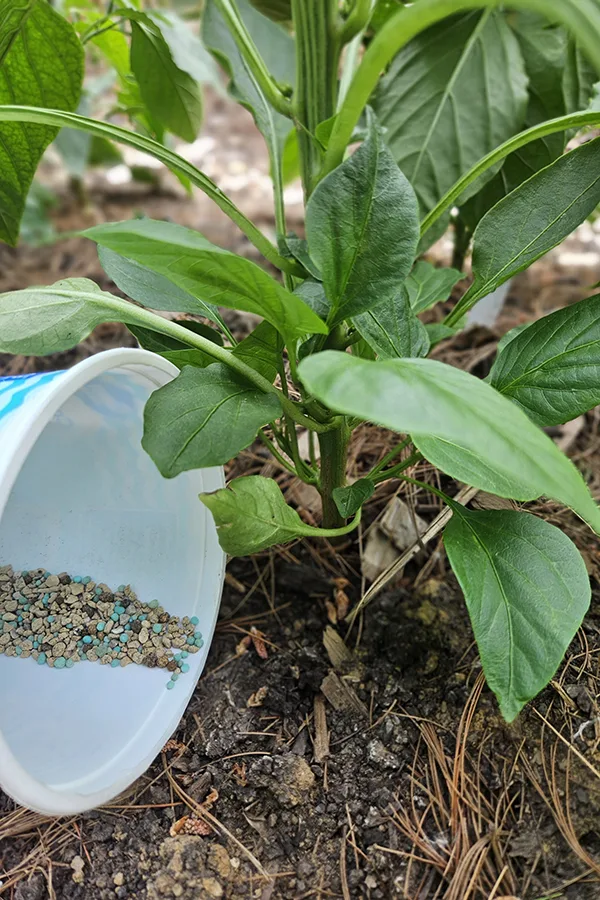Best Fertilizers for Peppers: Increase Growth and Flavor Naturally
Best Fertilizers for Peppers: Increase Growth and Flavor Naturally
Blog Article
Organic Vs. Synthetic Fertilizers: Which Is Best for Nurturing Healthy Pepper Plants?
In the world of nurturing healthy and balanced pepper plants, the choice in between synthetic and organic plant foods stands as a crucial choice with far-ranging effects. While both choices goal to offer necessary nutrients to sustain plant development, the subtleties of their influence on the soil, plant health, and the environment spark a dispute that mirrors throughout the gardening neighborhood. Understanding the distinct benefits and potential challenges of each plant food type is crucial for pepper growers seeking to optimize their yields while preserving a lasting and eco-conscious strategy.
Benefits of Organic Plant Foods
Organic plant foods supply an environmentally-friendly and sustainable technique to nourishing pepper plants, giving important nutrients without the use of synthetic chemicals. These all-natural fertilizers are obtained from natural sources such as garden compost, manure, bone dish, and seaweed, advertising dirt health and biodiversity. Unlike artificial fertilizers, natural choices release nutrients gradually, ensuring a well balanced and stable supply for pepper plants to prosper.
One substantial advantage of natural plant foods is their ability to enhance dirt structure and water retention. By enhancing dirt health and wellness, organic plant foods advertise useful microbial task, which aids in nutrient uptake by pepper plants. Additionally, natural fertilizers decrease the risk of chemical run-off, securing water resources from air pollution and guarding the atmosphere.
Furthermore, organic plant foods contribute to long-lasting soil fertility by advertising the growth of helpful soil microorganisms. These microorganisms assist break down raw material, releasing nutrients in a type that is easily available to pepper plants. best fertilizers for peppers. By fostering a healthy dirt environment, natural fertilizers sustain lasting pepper farming methods that profit both plants and the setting
Downsides of Synthetic Fertilizers
Synthetic plant foods, in contrast to their natural equivalents, posture various disadvantages when made use of to nurture pepper plants, affecting both plant health and wellness and ecological sustainability. One significant drawback of artificial fertilizers is their propensity to seep nutrients from the soil promptly.
In addition, the overuse of synthetic plant foods can contribute to water air pollution. Excess fertilizers not taken in by plants can remove right into water bodies, resulting in eutrophication, where algae flowers diminish oxygen levels in the water, hurting aquatic life. Synthetic plant foods are commonly obtained from non-renewable sources, such as fossil gas, adding to carbon discharges and ecological degradation during their manufacturing.
Nutrient Absorption Contrast
When comparing natural and synthetic fertilizers in terms of nutrient absorption, natural plant foods have the advantage of offering an extra balanced and slow-release source of nutrients. Organic plant foods include a range of macro and micronutrients that are not just valuable for the plants but also promote healthy soil microbial task, which assists in nutrient uptake.
In addition, natural plant foods enhance soil structure and water retention ability, allowing pepper plants to gain access to nutrients a lot more effectively. This improved soil high quality promotes root advancement, enabling better nutrient absorption. Artificial plant foods, although originally improving plant growth because of their high nutrient concentrations, may hinder long-lasting nutrient absorption by degrading soil health with time.
Environmental Impact Considerations

On the other hand, synthetic fertilizers, although frequently even more quickly offered and concentrated to plants, can have destructive effects on the environment otherwise applied effectively advice (best fertilizers for peppers). Their manufacturing needs high power inputs, bring about greenhouse gas emissions and contributing to environment modification. Furthermore, the overflow of excess synthetic plant foods can infect water resources, causing eutrophication and hurting aquatic ecosystems.
Finest Plant Food Practices for Peppers
When feeding pepper plants, optimizing nutrient uptake and decreasing ecological influence are essential factors to consider. To achieve this, it is vital to adhere to best fertilizer techniques customized to the details requirements of pepper plants. One essential practice is to execute a soil test before using any kind of plant foods. This examination can establish the pH level of the dirt and recognize any kind of nutrient shortages, assisting you in picking the most suitable fertilizer formulation.
An additional crucial method is to feed pepper plants at the correct time. Normally, peppers benefit from receiving plant food at planting and after that again when they start to blossom. Over-fertilizing can result in nutrient inequalities and damage the plants, so it is important to comply with recommended application prices.
In addition, choosing great post to read a well balanced fertilizer with an NPK ratio that suits pepper plants' demands is basic. Organic plant foods, such as compost or manure, can be exceptional options as they release nutrients slowly and enhance dirt framework with time. Nonetheless, artificial fertilizers can offer a fast nutrient boost when needed. Inevitably, combining synthetic and organic fertilizers carefully can aid nurture healthy and balanced pepper plants while lessening environmental influence.
Final Thought

Organic plant foods use an environmentally-friendly and lasting strategy to beneficial pepper plants, providing vital nutrients without the use of synthetic chemicals. Unlike this artificial plant foods, organic choices release nutrients slowly, making certain a constant and well balanced supply for pepper plants to grow.
Artificial fertilizers, in contrast to their natural equivalents, present different downsides when made use of to nourish pepper plants, impacting both plant wellness and environmental sustainability. When comparing natural and artificial fertilizers in terms of nutrient absorption, natural fertilizers have the benefit of offering an extra balanced and slow-release resource of nutrients.Furthermore, organic fertilizers boost soil framework and water retention capacity, enabling pepper plants to access nutrients much more successfully.
Report this page